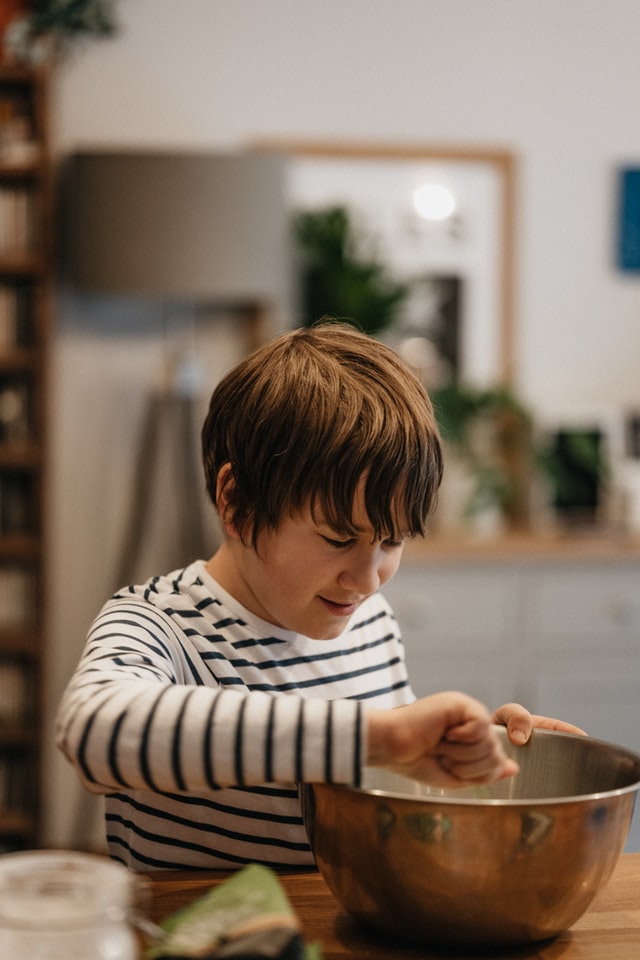Our job as parents and caregivers is to care and love our children. Part of that is to teach them how to be independent. We do this gradually over time, starting when our kids are very young with how to clean up their toys, dress themselves, brush their teeth and more. But when our children become teenagers, it seems like there is so much more teach and suddenly we feel like we have so little time. So how can you build independence in your teenager with autism and ADHD?
I personally am at this phase with our son J. He is now in his mid-teenage years, and I feel like I have so much to teach him! Fortunately, when it comes to self-hygiene and self-care, he does really well. He also has a good understanding of safety precautions, but we still have to focus on new situations and staying safe in those. He also has a handle on beginning money skills because I’ve been diligent about teaching both of our boys over the years. Once he has his first job, then we will be diving into a lot more money management topics for him. In addition, he does have a few basic cooking skills, but we have a long way to go. He also has most of the cleaning skills that he would need to care for a place of his own in the future.
Here are 14 tips to help you build independence in your teenager with autism and ADHD:
1. Set realistic expectations
This is a big one. None of us learn new skills overnight, so we need to be sure we set appropriate expectations for how long it will take our teens to become proficient at them. You also have to take their capabilities into account. For example, J is unsure about driving a car. Therefore, we have said it’s okay to wait a couple of years before he tries it. However, we can start teaching him how to read the bus schedule and take the city bus so that he can become familiar with that mode of transportation.

2. Build communication skills
One of the best things you can do is help your teen continue to improve their communications skills. Being able to communicate clearly and calmly will help them all throughout life. They need to be able to state their needs, ask for directions, call a customer service line, inquire about getting help, make doctor appointments, advocate for themselves, communicate problems and solutions, and so much more. If your teen struggles with spoken word, be sure to improve their skills communicating through any support they need such as alternative/augmented communication (AAC) and visual supports.
3. Teach your child about self-care
Taking care of ourselves is so important, so these are skills that teens must master. They need to be able to fully handle their own hygiene such as showering, shaving, using deodorant, brushing their teeth and more. For teenage girls, they need to understand how to manage pads and tampons for their periods. All of our teens need to help manage any medication they are taking. They need to understand what each pill or medicine is, how it helps them, what are the side effects and when to take it each day.
They also need to know how to manage their mental health. What do they do to de-stress when they feel overwhelmed? How can they take steps to stop a meltdown they feel coming on? Our teens need to know how to exercise and access and use exercise equipment.

4. Discuss importance of safety
When our kids were young, we taught them about avoiding “stranger danger,” not running into the street, staying away from a hot stove, and not answering the door when it’s someone we don’t know. As teens and adults, there is so much more they need to learn. They need to know about how to avoid the potential dangers of people on the Internet that could lead to identify theft, catfishing and other situations. Our teens should learn to be alert when out in public to keep themselves safe while using public transportation, getting money out of an ATM and other situations. They need to know how to secure their home before leaving, and many more safety precautions that we manage as adults.
5. Assign chores and other personal responsibilities
Learning to “adult” means knowing how to take care of a home and ourselves. That includes learning basic cleaning skills such as vacuuming, dusting, cleaning bathrooms, dishwashing and doing laundry. It also means knowing how to take care of a yard (e.g. lawn mowing, weeding, etc.). A chore chart can help them keep on track. Personally, they need to know how to manage their own belongings – keeping their rooms cleaned up, putting away their clean clothes, organizing their rooms, keeping track of school assignments, charging their devices, and so much more. They need to understand how to manage their email accounts, online programs and password management.

6. Teach them life skills like how to cook
Cooking is a life skill every person needs to learn to build independence, including our teenagers with autism and ADHD. I feel comfortable that if J has to stay by himself for the day, he would have no problem making some basic meals for himself. He is very good with making food that uses the microwave. We are working on how to make food using the stove and oven. I feel confident that he will know all the basic cooking skills he will need by the time he graduates from high school. This is a key skill for our teenagers with autism and ADHD should learn to build independence.
7. Practice money management
One of the very best skills you can teach your child/teenager is how to manage money. Unfortunately, this is not something that is taught effectively in school, so it’s up to us parents and caregivers to do. I admit that I am a personal finance geek, but that came from having to learn some hard money lessons when I was in my twenties because I wasn’t taught them at a younger age. If I could go back in time, I would have made so many different money choices! I want to be sure that J and my other son have the knowledge about how to manage money, so they can avoid some of the mistakes I made.
We have given them allowance since they were a young age. I know parents have different views about allowances. My view is that we use allowance as a tool to teach our kids about handling money. Their weekly allowance equals 50 cents per year of age. (So when they were 12 years old, they were given $6 per week for allowance.) Some parents prefer to tie allowance to specific amounts for completing chores. When they were younger, I made them three jars: give, save and spend. They would divide their money between the three jars. I also set up savings accounts for them at the bank, and 50 percent of all money gifts for birthday and Christmas go into their savings accounts.
Once they are teenagers and especially once they have their first job, then it’s important to set up a checking account for them, teach them to budget and start teaching them about credit, interest and investments. The more we can teach them about managing money early on, the better they will handle their money.
8. Educate them about self-advocacy
During their lives, we as parents have been advocating for our children. As adults, they will need to advocate for themselves as much as they can. While we still can help them (and some will need more help than others), it is important for them to learn this key skill.

9. Help them learn about time management
Time management – so many of us struggle with this one ourselves! We need to help our teenagers understand how to manage their time and better understand the concept of time. When J was younger, we used a Time Timer that visually showed what time he had to do something. Many of his teachers used it as well in his classroom. In fact, I had one teacher who told me that she was so happy that I had introduced her to the Time Timer because it helped her whole classroom!
They also need to learn time basics like how to get themselves up in the morning with an alarm, watching the time so they are ready to leave for school, and managing time limits for being on screens.
Because our teenagers also struggle with ADHD, using calendars, reminders and other ways to combat forgetfulness is something they will need to do all their lives. Learning these skills now will help set them up for success in adulthood.
10. Guide them toward vocational skills
Our teenagers with autism and ADHD usually have their focused, or special, interests. Could their interest lead to a future career? If so, look for opportunities to support them in developing skills they could use for future jobs. Does your child love computers or making videos? Is there a summer camp in your area they could attend to build those skills? Is there a club at school they could join that is related to their interest and help them learn? Could they make videos and create a YouTube channel about their interest? Do they love to work with their hands? You could create a place in your garage or basement where they can work on projects. As a parent, there are many things you can do to help your child start preparing for employment.
It’s also important that we encourage our teens on the spectrum to get their first job while they are in high school. Studies have shown that is key to their ability to be employed or obtain secondary education after they’ve graduated. Volunteering also can help develop the skills they need for a job.

11. Assist them in creating systems
Developing systems will be helpful in your teenager’s life. For instance, you can help them create a box with all of their school supplies to have them in one place when they are doing homework.
12. Learn to let go as a parent
I’ll admit it – this is tough one for me. I am so used to helping my kids with everything that it’s hard for me to stop and let them do things on their own. It’s something I have to work on every day, but I’m getting better. I know by doing so that I am helping them build independence, and that it’s imperative for my son with autism and ADHD to do that.
13. Reward effort
Praising effort encourages a growth mindset, and that is what we want in our teenagers. Putting in the effort is how they will learn new skills, and that is what we need to reward as parents and caregivers.
14. Be patient
“Patience is a virtue” is usually an understatement for us parents! How many times do we say that we will just get that task done ourselves because it’s easier and faster than asking our child/teen to do it? We need to remember to be patient and let our teens learn new skills in their own way and at their own pace.
Our teenagers are growing toward adulthood every day, so it’s important that we help them develop the skills they need to be successful in life. So how have you helped build independence in your teenager with autism and ADHD? Leave a comment to share your ideas with other parents!








